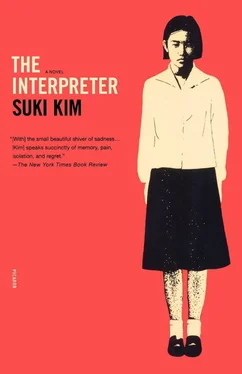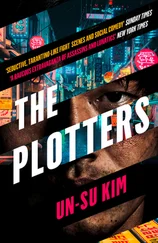“A brave woman, but not brave enough maybe,” he says as if to himself. It is obvious that just the mention of his wife brings him home, if only for a moment. Suzy says nothing. She knows that this is his moment, that his mind has drifted far from here.
“Some guy once told me that the airport is where the American dream begins. It’s all up to whoever picks you up there. If it’s your cousin who owns a dry cleaner, you go there and learn that business. If it’s your brother who fillets fish for a living, you follow him and do that too. With me, it was my wife who’d come before me and found a cashier job at a fruit-and-vegetable store. Women are harder than men. The only thing I thought she knew how to do was be a housewife. She was eighteen when we got married right after I was released from the army. I never doubted that we’d grow old together. People who marry that early, they often do.”
In his mind, he is a young soldier stationed at a remote country near the 38th Parallel. Every night, before falling asleep in his barracks, he takes out his wallet to steal a glimpse at a photograph. Even in the wrinkled black-and-white photo, he can tell that her lips are the shade of a cherry blossom, the ribbon in her hair is a matching pink. A bashful girl smile. Anticipating her lover’s gaze, she forgets the usual reserve before a camera.
“It was always the two of us, from the beginning, all the way until…” His voice is a bit shaky now, as though he is overwhelmed by the rushing memory. “We’d never had any children. She couldn’t conceive. Neither of us knew when we got married, and later, when we found out, my wife was more terrified than me. She thought it was a sin. She even said that I should divorce her. In Korea then, and maybe even now, those things mattered a lot, having kids, carrying on a family name. Sure, I was upset. I never thought that I’d be without a son, or even a daughter. That was what one did, get married, have children. But then, once I accepted the fact, I wasn’t so bothered. I even told my wife that it worked out better, imagine dragging children through the pain of it all, of leaving Korea and getting here. My wife, I don’t think she ever got over it. She felt forever like a sinner. She thought she’d wronged me by not producing a son. Sometimes I think that might’ve been why we left Korea. Leaving a homeland, it cuts into you like nothing else. It’s like an illness, haunting generations. But I wonder if we hadn’t also hoped that America might make us forget, that in this new country a tradition wouldn’t shun you because you’re a middle-aged couple with no children.
“I’d been a manager at a small trucking company in Korea. I was forty-one when they went bankrupt overnight and left me with nothing, no severance pay, no workers’ compensation. Jobs were scarce then. It was the late seventies. They say that it was our economy-building era, but I tell you, the only economy that was building was for the rich, Samsung, Hyundai, Daewoo, the megacorporations, chebul, you know. It was the rest of us, the working people, who paid for it. No small company survived. Bank loans, mortgage rates, trade regulations—everything worked against you. It was the time. There wasn’t much any of us could do, except wait for a better time, or get out, which is what I did.
“I’d heard of a guy who’d moved to a place called Brooklyn in America and made a good life. Korea is a small country; once you lose your chance, there’s nowhere you can run to and start over. So we looked for ways of getting to America. Not legally, of course, because obtaining the American visa was even harder than finding a job. We found a broker who hooked my wife up with this church group whose yearly choir tour to New York was due in just a few months. I followed, about a year later. The same broker got me in through the Canadian border. Fake papers, fake names, it’s a miracle what those immigration brokers can fix. I landed at JFK in the fall of 1980. My wife wept at the airport. I couldn’t believe how much older she looked in just one year. Those first years were hard, the things I saw and did when I first got here, this country called America, this number-one country in the world, it had nothing to do with home.
“I started out as a setup guy at the Bronx store where my wife was working. The owner was a good man, hiring me when he could’ve gotten anyone much younger. It was a favor to my wife. She was an honest worker, and he knew that. In a few years, I was basically managing the store. A tiny store, just my wife and I, and a few Mexican kids. The work was hard, but we were happy. We were building something together, finally a new life in a new land. I wonder sometimes if that wasn’t the happiest time of my life. She and I, starting a life together for the second time, like newlyweds almost…” He pauses suddenly, as if struck by the image of the two together. An early morning, and the sun gloriously shining upon the stalls of fruit. The ripe yellow of plantains, the green hills of Hass avocados, the firm blush of McIntosh apples. Fruits were a sign of home then. A different kind of home from what he had known before, from what he knows now, not this studio apartment he crawls into for sleep.
All Suzy can do is listen. She is afraid of breaking his spell, although she cannot quite make sense of his story. Was that why his wife committed suicide? Because she could not conceive? But why thirteen years ago? The woman must have been in her late forties by then. What does this have to do with her parents?
“Sometimes I think maybe she was right. If we’d been able to have children, she might not have been so rash, or so heartless,” he mutters as if to himself, as if he’s reached the limit of his memory. He never talks this much. He never gets visitors. He is sucking on his Marlboro as though it is the only life left in him. He then says without looking up, “But that didn’t help your parents, did it, to have you and your sister.”
Suzy is startled by this sudden turn. She stares at him, although she cannot see his eyes. Finally, she asks, “What makes you say that?”
“Because you wouldn’t be here otherwise. You wouldn’t be so sure they’d wronged me.”
It only occurs to her now how odd it is for her to be here, to show up at the house of someone who might have had reasons to hurt her parents. Why did she come to him instead of notifying the police? Why was she so quick to believe Mr. Lee’s claim? Why didn’t she give her parents the benefit of the doubt? By showing up here, by asking this strange man for an explanation, she seems to have already made up her mind. Behind the murder, the guilt lay with her parents.
Whose side is she on?
The air feels stuck. Its lumpy clouds surround her, and she can barely breathe. She walks over to the sink. She takes two glasses from the shelf and fills them with water. She puts one glass in front of him before sitting down.
“Thank you,” he says, reaching for the glass. He looks exhausted. Aged, she thinks. It is clear that he is done talking. Almost three o’clock, long past his bedtime. Although, today, it does not seem likely that he would be able to fall asleep. The cigarette has burned itself out, the ashes drooping limp and long, still hanging on to the filter. The room has gotten much darker, as though the sun outside has given up. And the two mourners in their devastated corners.
Neither will speak. He won’t speak anymore. He is waiting for her to leave.
Why is she here?
She suddenly becomes aware of her parents gazing at her from all corners. She can almost hear them, feel their eyes on her. She rises abruptly, as if fleeing. With her right hand, she brushes back a strand of her hair falling in her face.
“I should’ve recognized you right away,” he says, walking her to the door. “You take after your mother, more than your sister does.”
Читать дальше












